(A)(C8H14)[O]−−−−−−−−→AccKMnO4(B)+(C)+(D)
(A) requires 2mol of H2 for its saturation.
(B) reduces ammoniacal AgNO3 and gives yellow colour with NaOH+I2.
(C ) does not reduce Tollens reagent but gives iodoform test.
(D) on dehydration with conc. H2SO4 gives a mixture of colourless gases.
The mixture of colourless gases is:
a.CO2
b.CO
c.CO2+CO
d.CO2+CO+H2O
The correct Answer is:D
(2DuinA). It may have either two (C=C) or one (C≡C) bond. Formation of three compounds on oxidation of (A) shows that it contains two (C=C) bonds. (B) reduces ammoniacal AgNO3 solution and gives iodoform test.
Therefore, (B) is an aldehyde and it is (CH3−CHO)(two-C-atom aldehyde).
(C ) is a ketone containing ⎛⎜
⎜⎝CH3−O∣∣C−⎞⎟
⎟⎠ group (since it gives iodoform test).
(D) is two-C dibasic acid since it gives CO2,CO, and H2O with conc. H2SO4. So, (D) may be oxalic acid (HOOC−COOH)(two C atoms). Total C atoms in (C ) must be four.
(A)(C8H14)⇒C(B)H3CHO(two C atoms)+(CH3COCH2CH3)(four C atoms)+(HOOC−COOH)(C)(two C atoms)(D)
Structure of (A)⇒
Structure of (A) ⇒
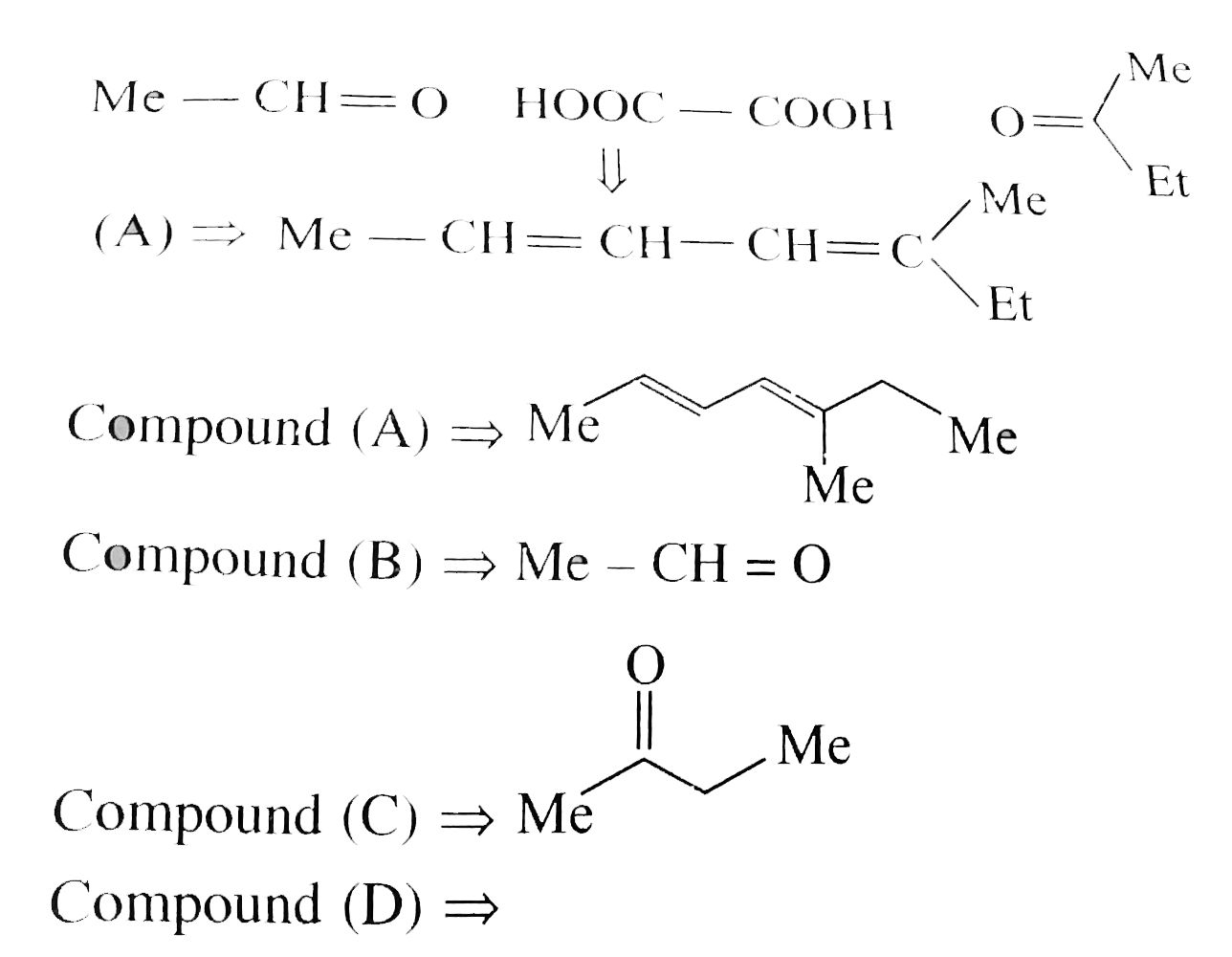
Compound (D) ⇒
HOOC−COOHConc.H2SO4−−−−−−−→CO2+CO+H2O
Topper's Solved these Questions
- REDUCTION AND OXIDATION REACTION OF ORGANIC COMPOUNDSBOOK - CENGAGE CHEMISTRYCHAPTER - REDUCTION AND OXIDATION REACTION OF ORGANIC COMPOUNDSEXERCISE - Exercise (Multiple Correct)
35 Videos
- REDUCTION AND OXIDATION REACTION OF ORGANIC COMPOUNDSBOOK - CENGAGE CHEMISTRYCHAPTER - REDUCTION AND OXIDATION REACTION OF ORGANIC COMPOUNDSEXERCISE - Exercise (Single Correct)
90 Videos
- REDUCTION AND OXIDATION REACTION OF ORGANIC COMPOUNDSBOOK - CENGAGE CHEMISTRYCHAPTER - REDUCTION AND OXIDATION REACTION OF ORGANIC COMPOUNDSEXERCISE - Exercise
11 Videos
- QUALITATIVE INORGANIC SALT ANALYSISBOOK - CENGAGE CHEMISTRYCHAPTER - QUALITATIVE INORGANIC SALT ANALYSISEXERCISE - Viva Voce Questions And Part-C (Analysis Of Cations)
42 Videos
- SOLID STATEBOOK - CENGAGE CHEMISTRYCHAPTER - SOLID STATEEXERCISE - Ex 1.2 (Objective)
9 Videos
Similar Questions
(A)(C8H14)[O]−−−−−−−−→AccKMnO4(B)+(C)+(D)
(A) requires 2mol of H2 for its saturation.
(B) reduces ammoniacal AgNO3 and gives yellow colour with NaOH+I2.
(C ) does not reduce Tollens reagent but gives iodoform test.
(D) on dehydration with conc. H2SO4 gives a mixture of colourless gases.
The compound (A) is:
View SolutionConc. HNO3+H2SO4 mixture gives
View Solution
Knowledge Check
(A)(C8H14)[O]−−−−−−−−→AccKMnO4(B)+(C)+(D)
(A) requires 2mol of H2 for its saturation.
(B) reduces ammoniacal AgNO3 and gives yellow colour with NaOH+I2.
(C ) does not reduce Tollens reagent but gives iodoform test.
(D) on dehydration with conc. H2SO4 gives a mixture of colourless gases.
The compound (D) is:Aa.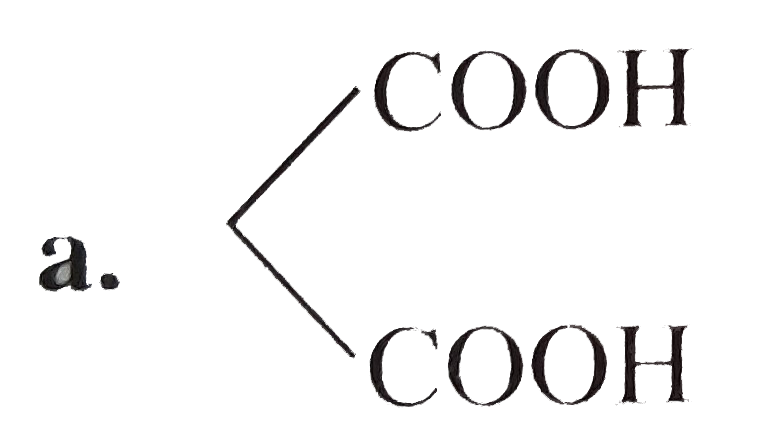 Bb.
Bb.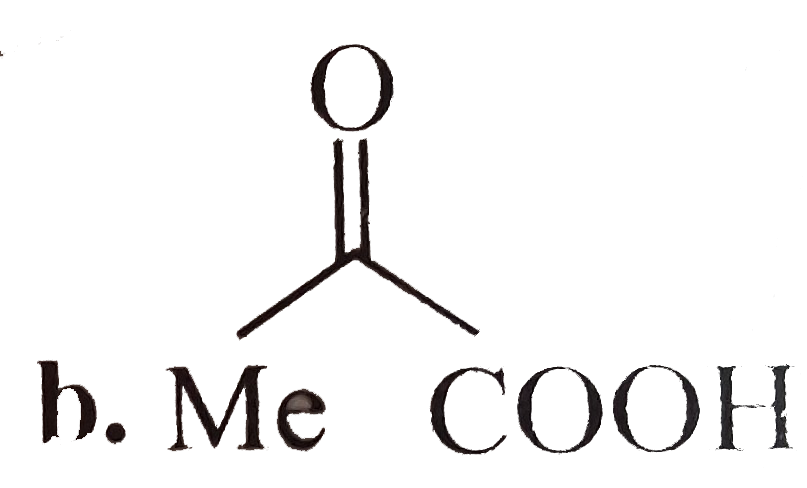 Cc.HOOC−COOHDd.
Cc.HOOC−COOHDd.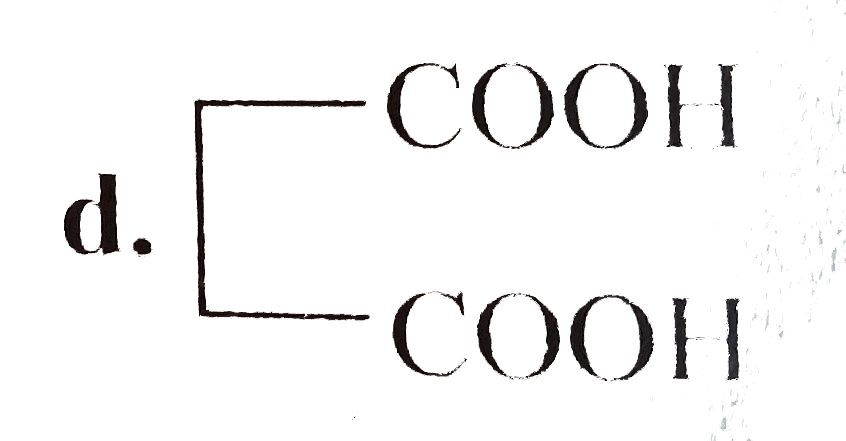
(A)(C8H14)[O]−−−−−−−−→AccKMnO4(B)+(C)+(D)
(A) requires 2mol of H2 for its saturation.
(B) reduces ammoniacal AgNO3 and gives yellow colour with NaOH+I2.
(C ) does not reduce Tollens reagent but gives iodoform test.
(D) on dehydration with conc. H2SO4 gives a mixture of colourless gases.
The compound (C ) is:Aa.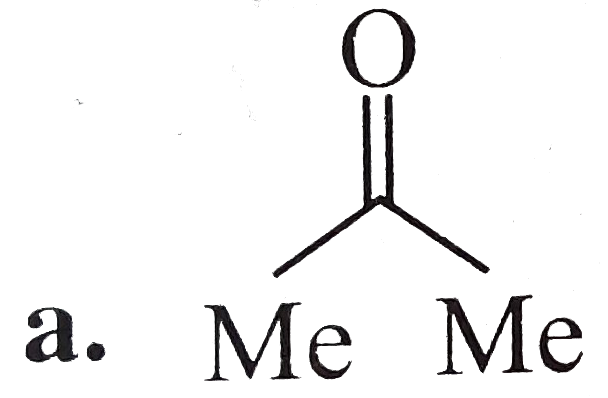 Bb.
Bb.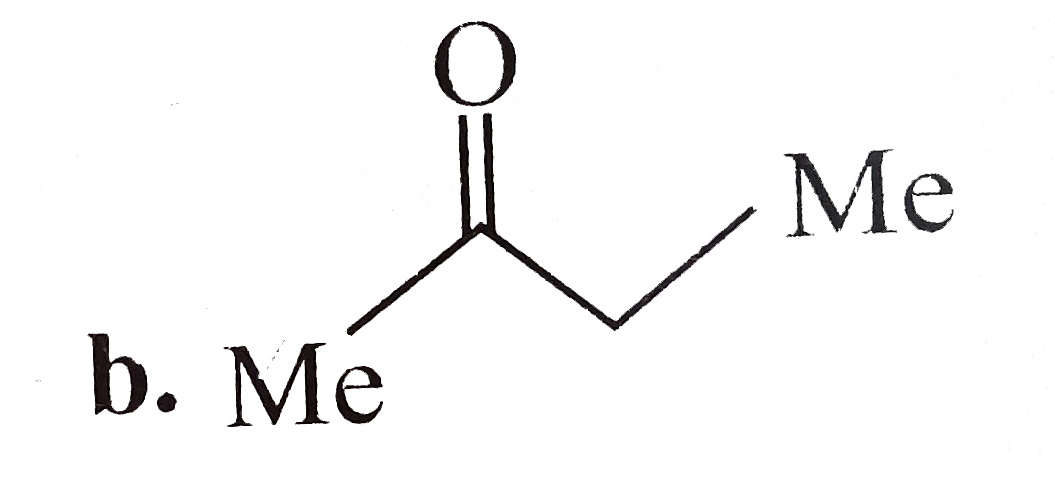 Cc.
Cc.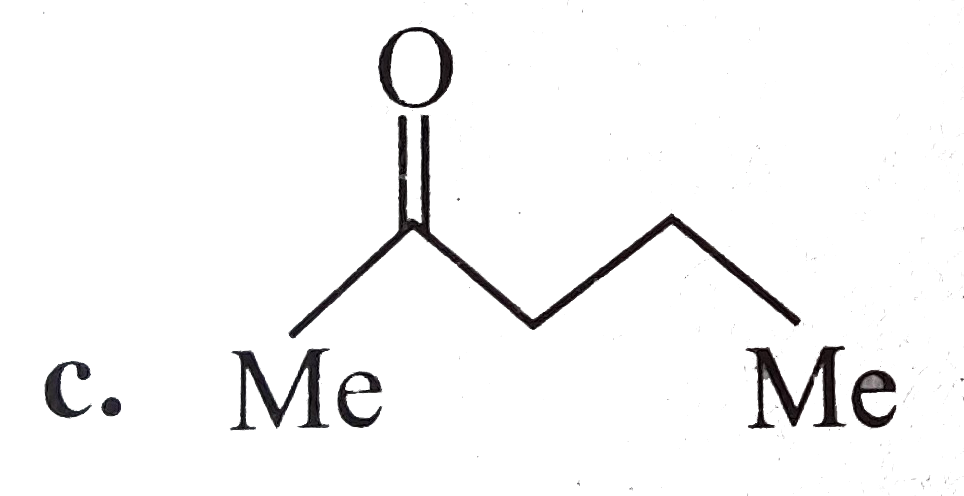 Dd.
Dd.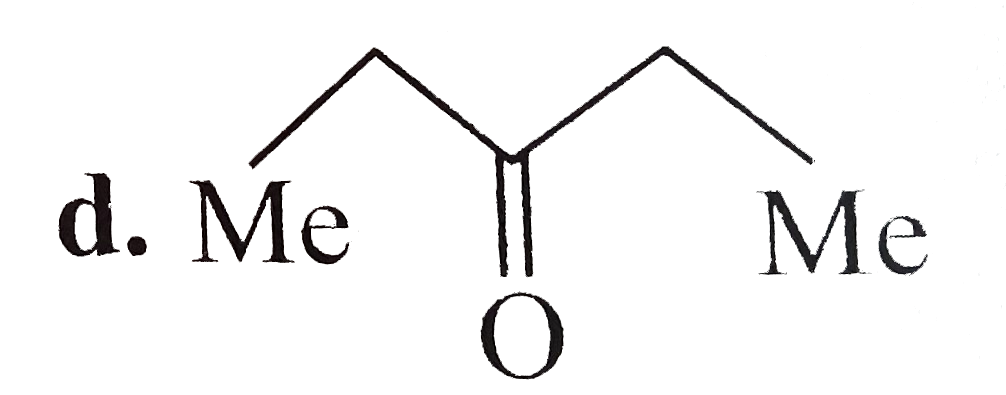
(A)(C8H14)[O]−−−−−−−−→AccKMnO4(B)+(C)+(D)
(A) requires 2mol of H2 for its saturation.
(B) reduces ammoniacal AgNO3 and gives yellow colour with NaOH+I2.
(C ) does not reduce Tollens reagent but gives iodoform test.
(D) on dehydration with conc. H2SO4 gives a mixture of colourless gases.
The compound (B) is:Aa. BMe-CH=OCc.
BMe-CH=OCc.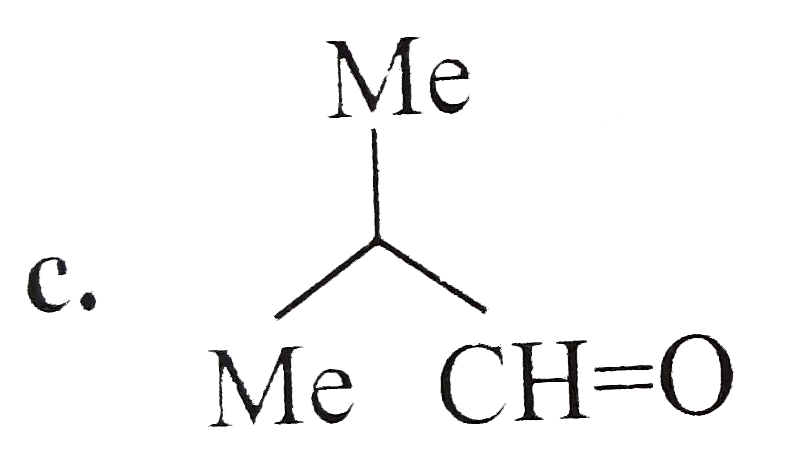 Dd.
Dd.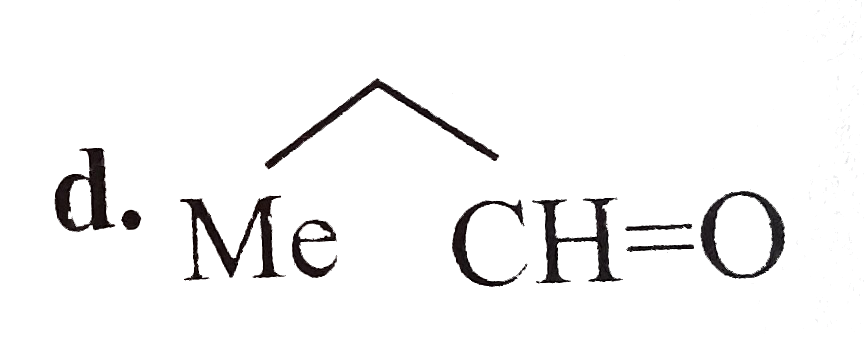
Dehydration of methanol with conc. H2SO4 at 140∘C gives
View SolutionNaCl, NaBr, NaI mixture on adding conc. H2SO4 gives gases, respectively :
View Solution(A)(C9H12O)[O]−−−−−−−−→HotKMnO4PhCOOH
i. (A) does not decolourise Br2 in CCl4, reacts with Na to give a colourless and odourless gas (B).
ii. (A) does not give iodoform test.
iii. (A) is a chiral compound and oxidation of (A) with CrO3/Py gives a chiral compound (C ).
iv. The colour of Cr2O2−7 change to blue-green when added to compound (A).
The colourless and odourless gas (B) is:
View Solution(A)(C9H12O)[O]−−−−−−−−→HotKMnO4PhCOOH
i. (A) does not decolourise Br2 in CCl4, reacts with Na to give a colourless and odourless gas (B).
ii. (A) does not give iodoform test.
iii. (A) is a chiral compound and oxidation of (A) with CrO3/Py gives a chiral compound (C ).
iv. The colour of Cr2O2−7 change to blue-green when added to compound (A).
The compound (C ) is:
View Solution(A)(C9H12O)[O]−−−−−−−−→HotKMnO4PhCOOH
i. (A) does not decolourise Br2 in CCl4, reacts with Na to give a colourless and odourless gas (B).
ii. (A) does not give iodoform test.
iii. (A) is a chiral compound and oxidation of (A) with CrO3/Py gives a chiral compound (C ).
iv. The colour of Cr2O2−7 change to blue-green when added to compound (A).
The structure of compound (A) is:
View Solution
